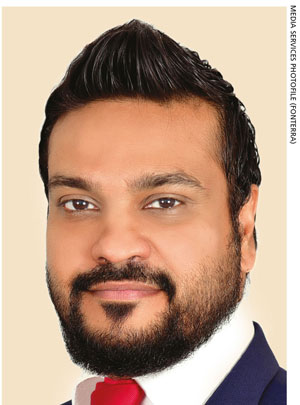FMCG SECTOR
Compiled by Yamini Sequeira
DISRUPTION THE NEW NORMAL
Roshan de Silva urges FMCG sector players to think today about tomorrow
Q: How has Sri Lanka’s fast-moving consumer goods (FMCG) sector evolved in the last few years?
A: The changes in the sector are polarised and influenced by macroeconomic factors. Those who invested or innovated have witnessed strong growth whilst others have struggled to maintain the momentum.
This sector has been influenced by growth in supermarket chains while traditional outlets have either lost out or upgraded themselves independently into medium-size modern trade establishments. In comparison, the retail environment has evolved. New trade channels have taken off albeit modestly – they include online e-channels for domestic and international products.
Consequently, niche FMCG products have witnessed growth. At the same time, discretionary FMCG products have shrunk. And there’s been an upsurge in the health food segment, which has led to new trades such as low sugar food products, organic food and so forth witnessing a boom virtually overnight.
Q: What are some of the factors that contributed to this change?
A: With greater access to international markets, there have been more imports of niche products. This has been welcomed by consumers who are exposed to international trends, research and changing societal attitudes.
Some local players have responded by upgrading their product ranges and breaking barriers to provide consumers with more diverse portfolios. Global and local regulatory bodies have also evolved by becoming more active in their recommendations (or otherwise) relating to changes, particularly in the food and beverage industry.
Q: Do you anticipate any major challenges for FMCG companies in the next 12 months?
A: The main challenge for FMCG companies today is how they think about tomorrow – disruption is the new normal. Organisations may gain by revisiting their journeys to understand whether they’ve evolved in terms of maturity. This will determine if they are able to manage the unknown or whether reengineering is essential.
‘Route to market’ is an example of a transformation that brings science to sales.
Companies need to completely rethink shopper strategy execution and craft unique plans built on understanding different retail environments. Furthermore, they must be prepared to undergo a potentially painful change management process to unlearn the past, and bring new thinking and strategy to unlock the future.

Q: What should brands focus on to ensure they remain relevant?
A: First, brand authenticity is key, which implies transparency in everything we do. It is about the heritage of the company, why it exists and its purpose.
FMCG companies need to be transparent in revealing their sources and processes because today’s consumers want to know what kind of company is behind a brand. Product responsibility is at the core of the food and beverage industry.
Complying with international standards, strengthening the use of food safety management systems and educating consumers about making healthier choices are some of the ways in which companies can work with governments, international organisations, scientists and civil society to ensure food safety.
Moreover, brands need to be led by a purpose that is shared by their people, consumers and stakeholders across the value chain.
Lastly, new forms of collaboration are vital to help drive the sustainable evolution of FMCG brands.
Q: And what are the emerging trends in the sector?
A: The growth of modern trade and upgrading of traditional trade will continue to offer shoppers and consumers a wider variety of options in the FMCG sector.
But at a time when the economy is under siege, we will also witness growth in product SKUs that are more suited for lower cash outlay price points and packaging formats that are cheaper – such as sachets, for example.
In short, we are moving to a future that is about customisation and individualism.
Q: How would you rate the quality of FMCG marketing and promotions?
A: The quality of marketing and promotions in any market is heavily influenced by the amount of money companies have to spend, as well as the size of the opportunity. Sri Lanka has the talent to carry out world-class marketing and promotions, and we have examples in this space. However, the lack of infrastructure and investment is stifling growth.
Q: What is a defining skill that any aspiring leader planning to make it in sales and marketing must possess?
A: To be ahead of the competition, as well as drive and embrace innovation, agility is key – along with a mindset that opens doors to useful learning experiences.
Compared to an individual with a silo mentality, an agile person will be able to contribute to more strategic projects across the organisation, and be open to greater exposure and opportunities – and this leads to enterprise thinking.
Resilience is necessary to forge ahead despite obstacles. An aspiring leader needs to give his or her team confidence, and motivate them through external circumstances, natural hazards, the plight of consumers, economic slowdowns and so on.
Challenges will crop up every year but a resilient leader ensures that the business stays spirited and grows.





Leave a comment